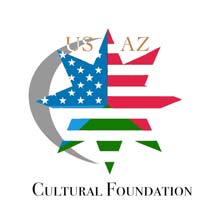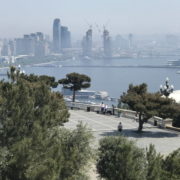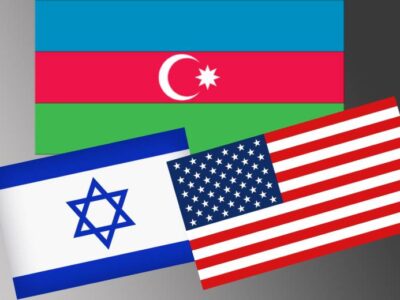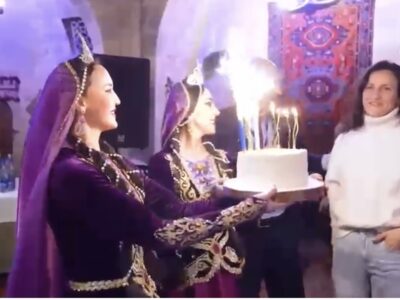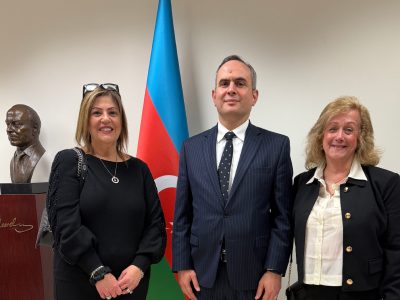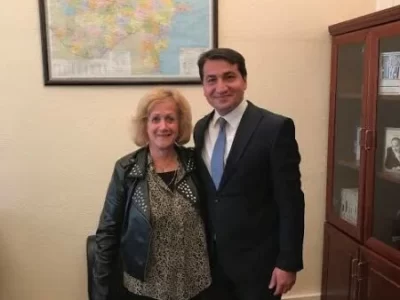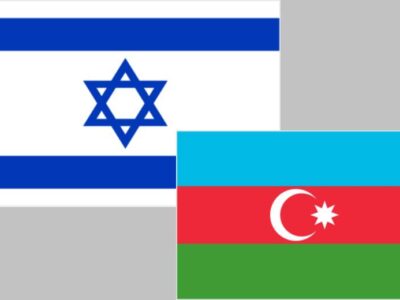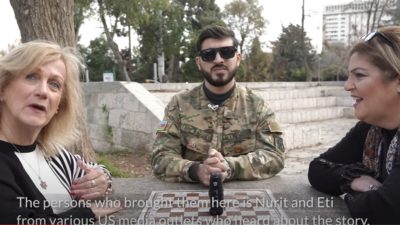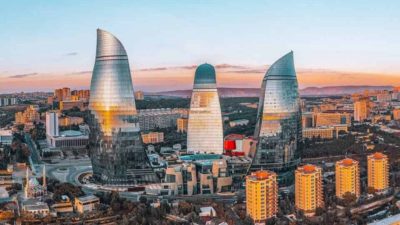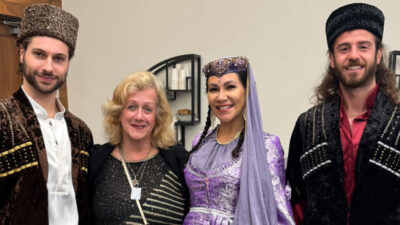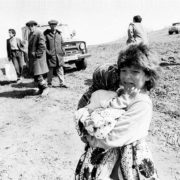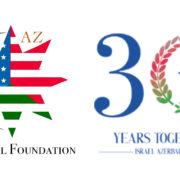Azerbaijan’s Jewry, a nestled Jewel.
In this two-part essay, part I covered the history of the Jews in Azerbaijan in the early centuries BCE and A.D. Part II, herein, is about Jewish life in Azerbaijan nowadays and foreseeable future plans.
I held an interview with Rabbi Shneor Segal, Azerbaijan’s Ashkenazi Jewish Community Chief Rabbi and the Chabad Emissary. Additional information about present life in the ‘Red Village’ in the Guba District was provided by Igor Shauliv, the Director of the Mountain Jews Museum.
My conversation with Rabbi Segal took place a day after a week full of events, in which the Jewish community celebrated the Jewish Holiday of Chanukah and was honored with several non-Jewish Azerbaijani guests who joined in the festivities.

During the Chanukah festivities, Mr. George Deek, Israel’s ambassador to Azerbaijan celebrated the 30-years of distinct relations between the two countries. He was honored with the presence of Mr. Mikayil Jabbarov, the current Minister of Economy of the Republic of Azerbaijan. Members of Young Diplomats Azerbaijan Associations attended the Chanukah 8th candle lighting, on the last day of the holiday.
As the Jewish tradition goes, a group of Jewish rebel warriors of priest-farmers from the city of Modi’in, known as the Maccabees, started a revolt against the Greeks who occupied their land and defiled their Temple. Under Judas Maccabeus’ leadership, the Jewish people fought the Greeks and succeeded in re-taking Jerusalem and expelling the Greeks from the city.
According to the Talmud, the central text of Rabbinic Judaism and the primary source of Jewish religious law, when the Maccabees entered the Temple and wanted to light the seven-branched candelabra – the Menorah, there was no ritual oil fit to light the Menorah. They did however find a small jar of ritually pure oil, expected to last one day. Miracles and tradition do go hand in hand and a miracle occurred. The Menorah burned for eight days on this small amount of oil, which lasted long enough to produce new pure oil.

Ever since, in Israel, during Chanukah the Jewish people say “a big miracle happened here.” Jews in the Diaspora, like the ones living in Azerbaijan say: “a big miracle happened there [In Israel].” But this year, for Rabbi Segal, the saying is: “a big miracle happened here [in Azerbaijan] as well.” And he pointed out many reasons.
Rabbi Segal and his wife arrived in Baku, Azerbaijan, some twelve years ago. The Ashkenazi Jewish community approached the Chabad headquarters in the former Soviet Commonwealth seeking a rabbi for their community. The reason was, they knew that the rabbi Chabad would send would be dynamic; knowing that the community would find it difficult to pay for his services, he needed to be able to manage and settle down no matter what it takes. This is Chabad’s ideological approach and as Rabbi Segal says, “thank God, we managed and we have managed and each day counts for a new improvement and a new goal is achieved.”
Upon arrival in Baku, Rabbi Segal saw that though there was some Jewish community life and some synagogues held activities much more needed to be done. He wanted to see the community flourish and grow.

As the community rabbi he knew his goal was to build the community, to reach as many Jews as possible and have them partake in Jewish life, attending prayers and Jewish community events. After all, 70 years of Communism rule had a rather upsetting impact on all the Jewish communities in the Soviet Union, including Azerbaijan’s ancient Jewish community, now made of Ashkenazi and Caucasian Jews.
There was a need for a revival. Like an ancient house, tall and big, with sturdy deep-rooted foundations, Azerbaijan’s Jewish community’s uniqueness and goodness needed to be exposed and simply brought up-to-date, to modern, present time. The rabbi wanted to take a completely new approach to Jewish life in Azerbaijan.
Rabbi Segal decided that his target was the young Jews, the future of the community. It was no easy process.
In General, Jews living under the Soviet Union rule, to which Azerbaijan belonged, suffered because they were Jews. The estimated number of Jews living in Baku today is 25,000 and as Rabbi Segal told me, Before COVID-19 there was hardly a week passed that he did not meet a person who told him he was a Jew or members of his family are Jewish. Rabbi Segal saw his job to make the practice of Judaism interesting for the community, much fun and enjoyable. Because Judaism is a happy religion, he asserts.
Rabbi Segal took over the operation of the local Jewish Kindergarten and a school. With hard work the attendance increased. Today, all together, there are around 170 kids attending the school, at no cost. The school is rated by Azerbaijan Ministry of Education to be among the 20 top best schools in the country. Recently the government stepped in and much of the teachers’ salaries are now paid by the government of Azerbaijan.
Besides the activities at the school, Rabbi Segal started kids, youth and students programs and holiday events.

He opened a Sunday school in the synagogue for kids who do not attend the Jewish school. There are youth and student clubs for three different ages, as well as women’s clubs. All in all, before the Coronavirus shutdown, regularly on Sunday, some 250 Jewish kids, youths and students visited the synagogue, which also serves as a Jewish Community Center, to attend activities.
During Chanukah young Jews went visiting elderly Jewish people’s homes and brought them food parcels as well as helped them light the Chanukah candles. The purpose is to teach Jewish youths the Jewish tradition of giving, of doing something for another fellow Jew. To always be there for someone who needs you.
This revival and approach has caused significant changes in the life of Azerbaijan’s Jewish Community.
Celebrating Chanukah in Baku in 2021
During the Jewish holiday of Chanukah that just ended, due to COVID, prayer attendance in the synagogue was limited, and could not exceed 50 people. In order to have as many Jews partake in the Chanukah festivities, Rabbi Segal organized different events each day, for kids, youth, students, women and the elderly; to light the menorah candles, to have a meal, to have anyone who wanted to attend a Chanukah event partake.
He also brought to Azerbaijan 1,500 Chanukah menorahs (the customary Chanukah candle holder) and handed them to any Jew who asked for it.

This approach, slowly and methodically, is re-creating the Jewish life that was somewhat lost due to the COVID restrictions.
Nowadays, on Shabbat, the weekly Jewish holy day, after the prayer service people stay longer and attend Kiddush, literally, “sanctification,” a blessing recited over wine or grape juice to sanctify the Shabbat and Jewish holidays.
From my own experience, on one of my visits to Azerbaijan I attended the Saturday morning prayers service at the Ashkenazi Synagogue. I stayed on for the Kiddush after which they served Cholent* (*Cholent is a traditional Jewish stew dish, usually simmered overnight for 12 hours or more, and is served at lunch on Shabbat [Sabbath]) and I must admit here that among the many Cholent dishes I have had in my lifetime the best Cholent I have ever had was in the Ashkenazi Synagogue in Azerbaijan.

Rabbi Segal is satisfied. “Thank God the community is making headways and things are moving forward and developing in a very positive way,” a statement he repeated often. His latest good news is that with the government helping to build the much-needed Mikveh – the bath used for the purpose of ritual immersion to achieve ritual purity in Judaism – in Baku, and with much local and abroad support, the project is already well in progress to be completed soon.
Rabbi Segal is enthralled. As an Israeli Jew who grew up in Israel, when he was offered to come to work in Azerbaijan, a majority Muslim country, he said “no way.” It was not for him; he had a wife and four young children at that time and he did not see Azerbaijan as a place for him to go to work. However, when he arrived he was taken back by the local attitude. It was the real way of coexistence between Jews and Muslims, respecting and even helping each other, not only at the government level but in the street level as well. All these elements play a role in the constant growth of the Jewish community in Azerbaijan.

COVID Era
The synagogue was closed for one year and four months. That was a difficult time to say the least. Now, slowly, life returns to normal. It is almost like having to rebuild some of the already much achieved Jewish life. Sadly, people got somewhat accustomed to living without attending synagogues or Jewish activities. The magnate of vibrant Jewish life did not magnetize for a long while.
Rabbi Segal repeats himself, ‘it was no easy period.’ The government of Azerbaijan took extremely cautious measures to prevent the spread of the virus. And again he repeats, “thank God things are getting better.” The number of kids attending activities is slowly but surely growing, hopefully soon to reach the pre COVID number.

Future plans
The big foreseeable plan is to build a large Jewish Community Center to house a wide range of activities. A center that will also contribute to the Azerbaijani community at large with activities that are not necessarily involved religion. Simply speaking, the government of Azerbaijan generosity in so many aspects calls for the Jewish community to reciprocate.
In the long run the ambitious role, as Rabbi Segal sees it, is to create an effervescent Jewish community. With no one fretting over him, with the government constantly helping and the Azerbaijani nation hugging the Jews of Azerbaijan, all the elements are there to succeed.
Life often is sunk in darkness. The holiday of Chanukah teaches us that the only way to fight the darkness is to create and bring light. “One should never deal with darkness,” says Rabbi Segal. Rather, connect one more Jew to another Jew and to Judaism. It is not as simple as it sounds though. It requires much work.
Rabbi Segal believes that God created the world in such a way that there is always work, there is always something to do. Each person must see himself or herself as doing the work God expects them to do. The job of a Jew is to touch another Jew. And once you experience this outlook, you become addicted to simply doing good in any way possible; it is elevating spiritually and touches one’s soul. “This is who we are, the Jewish nation,” says the Rabbi.

What Is in Store in the Near Future?
Rabbi Segal’s positive attitude is catchy. He received land, adjacent to the synagogue, on which the Mikveh project is well on its way. He is in the midst of a charity campaign to collect the rest of the needed funds for the Mikveh project. Before we know Passover is at the door and he has to start preparing for this upcoming most meaningful Jewish holiday.
There is already a venue being prepared for a Kosher Jewish store, hopefully to be opened soon as well as a plan for a kosher* – *food/ premises in which food is sold, cooked, or eaten satisfying the requirements of Jewish law – restaurant, since the one that was operating before COVID shut down.

Current ‘Red Village’ Restoration
Currently the ‘Red Village,’ believed to be the world’s only all-Jewish town outside Israel, historical heritage is going through development and restoration.
A first of its kind museum in Azerbaijan, greatly dedicated to the ‘Mountain Jews’ history was built. The Museum is located in the old renovated Karchogi Synagogue, which was shut down during the Soviet era.
The initiative to create the Museum of Mountain Jews is attributed to Mr. Goda, Mr. Nisanov, Mr. Zarakh Iliev and now German Mr. Zakharyaev, all natives of Krasnaya Sloboda – Qirmizi Qasaba, the ‘Red Village,’ located across from the Qudiyalçay (or Kudyal) River and the town of Quba, in the municipality in Quba (Guba) District of Azerbaijan.
The International Charitable Foundation of Mountain Jews STMEGI, the largest organization uniting Mountain Jews from all over the world, was engaged in creating the museum’s general concept and the collection of exhibits.

A new tourist information center was opened, providing tours of the village, and the ancient Jewish Sloboda, settlement type in the history of the Old Russian regions, derived from the early Slavic word for “freedom” and may be loosely translated as “free settlement” is visited by tourists from all over the world.
The planning is to continue the development of the Jewish ‘Settlement,’ restore many historical buildings, create a modern tourist village with all the necessary infrastructure, from a modern hotel to a new medical facility in place, enhancing the full potential of the village’s unique location and history.
According to recent data, nowadays there are approximately 2000 residents living in the ‘Red Village.’ During the summer months, due to the arrival of those living outside the village, this number increases.

There is no exact figure of the number of Mountain Jews, estimated to be 150,000 in total. The majority of the ‘Mountain Jews’ now live in Israel, with other communities in Azerbaijan, Russia, United States and Canada.
Azerbaijan’s Mountain Jews have left a remarkable and indelible mark on Jewish history in the Caucasus and beyond, all due to Azerbaijan’s social fabric’s coexistence and tolerance unique culture; the ability of the country’s society to be knitted together, relegating background and special interest in history for a common goal, and thus providing a positive and pleasant place to live.
With Rabbi’s Shneor Segal’s energy, with the ‘Red Village’ restoration efforts, with the government of Azerbaijan’s much-appreciated support, one can only expect a bright and vibrant future for the Jewish community of Azerbaijan.
